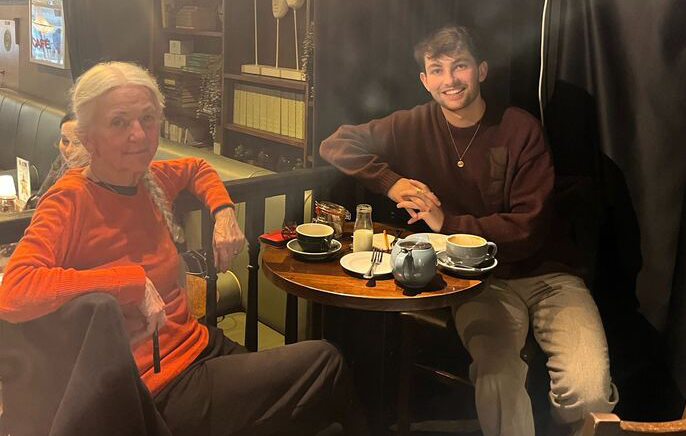There were 81 minutes on the clock as Linda Djougang looked on. Ireland were 18-14 up against Scotland in their 2020 Six Nations first round clash at the RDS, but the visitors were pressing.
Earlier on, Djougang had left the pitch after 54 gruelling minutes, but a yellow card for replacement Leah Lyon saw the prop re-enter the fray with the game approaching its conclusion. Ireland were stretched, and outnumbered.
With the clock in the red, Scotland’s Lisa Cockburn carried towards the 22, but Djougang was alive to it. Digging deep, the Leinster prop came in from the side, wrenching the ball out of Cockburn’s grasp and secured the turnover. Nicole Cronin booted the ball into touch, and that was that.
Leinster Women head coach Ben Armstrong was looking on from the stands that day.
“Just seeing her come back on and hold the scrum and get out of the scum and make that tackle and turn over to get the penalty which ended up winning Ireland the game … she’s learnt the game, you know.”
was showing her how to tackle, and she just lifted me off the ground one time. I knew that this was good
“She’s playing rugby now, not just accidentally on the ball”, he says.
The phrase “meteoric rise” is thrown around a lot, but in Djougang’s case it’s apt.
Four years before the Trinity nursing student got her first international cap, she hadn’t touched a rugby ball. She got her start with Wanderers RFC, after being spotted at a social tag rugby event.
When Wanderers head coach Dave Neville first met Djougang, she was a very different player to the one that stepped out in Energia Park last February.
“To be perfectly honest, she was completely raw, hadn’t a breeze”, he laughs.
Yet Neville instantly saw the potential within Djougang, then just 18 years old. “She had something, you know that kind of way?”, he says. “I remember, I was showing her how to tackle, and she just lifted me off the ground one time. I knew that this was good, you know.”
Once Djougang began to accumulate game time with the Dublin 4 outfit, her fitness improved and she gradually took to absorbing the rules of her new sport. Playing in Division 4 of the Leinster Rugby league system, Djougang established herself as a rising talent.
Neville saw her rapid progression, recognising a player that was quickly outgrowing the ability around her: “I remember we played a Blackrock development side. She scored a couple of tries but she was just running through them.”

“They were visibly pissed off … she was making them look bad. Blackrock wouldn’t like that, you know”, he says.
It wasn’t long before All-Ireland League clubs came knocking. Neville knew it would only be a matter of time before Djougang began attracting the attention of the heavyweights in the women’s game.
“[Old Belvedere] were showing a serious interest in her. It’s not a big circle or pool of players, and anyone who’s showing up at all, they’re out there trying to poach”, he says.
Neville admits that while it was difficult to see Djougang move on from Wanderers, her ability and growing ambitions left them with no other option: “You can’t stop them. It’s sport, you know what I mean. If they want to try push to the top, you can’t stop them.”
Despite this, he still holds a sense of pride in the role he played in seeing Djougang rise to the top of the women’s game.
“I would always say, look, if Linda’s ever on TV in an Ireland match, I’ll say to whoever I’m watching it with, some friends, I was the one who taught her how to tackle.”
They were visibly pissed off … she was making them look bad. Blackrock wouldn’t like that
Nora Stapleton, a former Irish international and coach at Old Belvedere, was instrumental in helping Djougang make the step up and represent her country. It didn’t happen all at once, however – Djougang quickly realised that she still had much to learn after she was signed by the Ballsbridge club.
“At the start”, Stapleton recalls, “we used to be blue in the face trying to get her to stop running sideways across the pitch. That was certainly something that needed to be hammered home”.
Strength and conditioning programmes were another step in Djougang’s progression that took time. “At the start, whenever we were trying to encourage her to go to the gym and things like that, she was quite conscious of doing … she felt that she was strong [already].”
But the dedication that Djougang showed – on and off the pitch – told Stapleton that she had the drive to make an impression at Old Belvedere and beyond. Between long shifts on placement and commutes home to North Co Dublin, the ambition was there to see: “She used to get buses in the morning, go to college, hang around, go to Belvo training and then have to try and get buses home.”
“She wouldn’t get home until after 11 o’clock at night sometimes. Just, the commitment there was unreal. I guess people don’t see that. Even some people on the team wouldn’t realise that she was making those kinds of journeys.”
This ethos was something Armstrong identified as central to Djougang’s character during his time working with her at Leinster. When he heard the story of how far she’d come to pull on the blue of Leinster, it all made sense.
“This year, with the interpros team, we actually had a session on the camp where we spoke about where we’ve come from and our stories.”
At the start, we used to be blue in the face trying to get her to stop running sideways across the pitch
“[Djougang] spoke about leaving her mother at nine, at the gates at departures [in Cameroon], and she thought her mum was coming with her. She didn’t realise, so then she’s flying alone at nine and landing in Ireland to her dad… ”
“It was such an emotional half an hour”, Armstrong says. “We all just realised where she was coming from … the girls realised what she’s done, what she’d gotten through to get to where she was.”
Now with eight international caps and numerous appearances at provincial level, Djougang is a household name in the women’s game. Stapleton feels vindicated seeing the kind of athlete she has become: “When you listen to her talk or interviews that she’s doing, she’s just really grown and flourished as a woman and an athlete.”
With the Six Nations postponed for now, Djougang will have to wait to get back in the scrum wearing the green of Ireland. However, with time on her side, Stapleton believes that Djougang has a lot more to give.
“We still haven’t even seen the player that Linda can be, you know. She’s on this really exciting, elite pathway now, and it’s great to see her grow into that elite athlete.”






